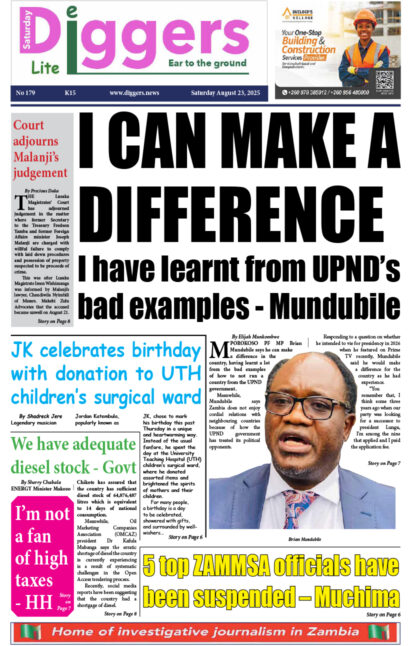THE SADC Electoral Observation Mission (SEOM) to the Kingdom of Eswatini has commended the people of that country for maintaining a peaceful political environment during the pre-election and voting day.
On Friday, people in Eswatini voted in parliamentary elections where candidates are not allowed to run for a political party.
President Hakainde Hichilema in his capacity as Chairperson of the SADC Organ on Politics, Defence and Security Cooperation had appointed former vice president Enock Kavindele as Head of the SEOM to the Kingdom of Eswatini.
Presenting SEOM’s preliminary statement on the conduct of the general elections held on Friday, Kavindele observed that campaign activities were also conducted in a peaceful manner.
“The Mission observed that the political and security environment during the Pre-election, Special Voting period and election period was calm and peaceful. This was also the general view of a diverse range of stakeholders that we consulted, though some were mindful of what they referred to as the undercurrents arising from the unfortunate civil unrest that took place in June 2021. The Mission further observed campaign activities which included organized and general campaigns conducted in a peaceful manner. The Police were visibly present during the voting process and did not interfere with the voting proceedings,” Kavindele said.
“The Mission noted that the country has conducted a review of the Electoral Laws. The Mission noted that the Constitutional Court has original jurisdiction in all matters concerning the elections. The Mission further noted the challenge involved, particularly for the lay citizens to acquaint themselves with the electoral laws given that the subject matter is covered by seven different Acts of Parliament. The main objective of our SEOM is to support our member States to make improvements that enhance the quality of our electoral systems, this in turn enhances national and regional peace and security. In this regard the SEOM makes recommendations for consideration by each relevant SADC Member State”.
Kavindele said the mission also noted the achievements made by the Electoral Boundaries Commission (EBC) with respect to the registration of voters.
“The Mission noted the achievements made by the EBC with respect to the registration of voters. In this regard, the EBC reported that a total number of 584,710, voters was recorded, out of which 313,093 are female while 271,617 are male. This equates to a remarkable 91.2% of eligible voters in terms of the 2018 National Census which stood at 641,121. The EBC facilitated the voter registration process from 10th May to 14th June 2023 and extended to 18th June, 2023. The extension was allowed to accommodate an influx of people that were registering on the last day of registration,” he said.
“In terms of the voters’ registration Act 4 of 2013, upon completion of registration, voters are afforded an opportunity to validate the voters register. The process entails filing of objections, correction of voters’ information and application of transfers from one Tinkhundla to another. In an effort to be more inclusive, the Commission conducted civic and voter education that targeted marginalized groups and held consultative meetings with Non-Governmental Organizations (NGOs) and relevant stakeholders particularly those representing people living with disabilities, the youth and women. This was a deliberate effort by the Commission to encourage meaningful participation and representation of marginalized”.
He said the mission however noted that representation of women in elected political positions in that country was minimal.
“The Mission noted that representation of women in elected political positions in the country is minimal. Based on the data on candidates who succeeded to participate in the secondary elections, the composition of Parliament is going to be predominantly male. Data from the EBC shows that the successful candidates for both Member of Parliament and Indvuna Yenkhlundla were 86% male and 14% female,” Kavindele said.
“The SEOM noted complaints from the youth that they feel excluded from the political arena due to cultural and socio-economic practices. They also complained about being prohibited from participation during campaigns before primary elections, which excluded them from disseminating their manifestos to the public to ensure that they are nominated to contest in elections. But most Polling Stations were accessible to all voters including persons with disabilities except a few cases where the polling stations were either located upstairs and/or had no ramps. Nonetheless, voters with disabilities, pregnant women and the elderly were given priority and those requiring assistance were helped. There was inconsistent application of inking of voters’ fingers. However, the Mission noted that there were several measures that were put in place to avoid double voting, and that the electoral law is silent on the issue of inking voters’ fingers”.
Meanwhile, Kavindele said the mission had commended the Kingdom of Eswatini for facilitating Special Voting for essential workers as well as timely distribution of election materials on the special voting day.
“The Mission commends the Kingdom of Eswatini for the following best practices that were noted: Facilitation of Special Voting for essential workers including security personnel, and the staff of the EBC, timely distribution of election materials on the special voting day. The Mission has observed the following areas of the electoral process and system that relevant stakeholders may wish to consider improving: Legal Framework, the Mission encourages the Government of the Kingdom of Eswatini to consider the consolidation of all the seven laws governing the elections into one comprehensive law for ease of accessibility. Political organisations and Political Parties. The Mission reiterates that the Government and citizens of the Kingdom conduct peaceful and inclusive dialogue with respect to the organization,” said Kavindele.























